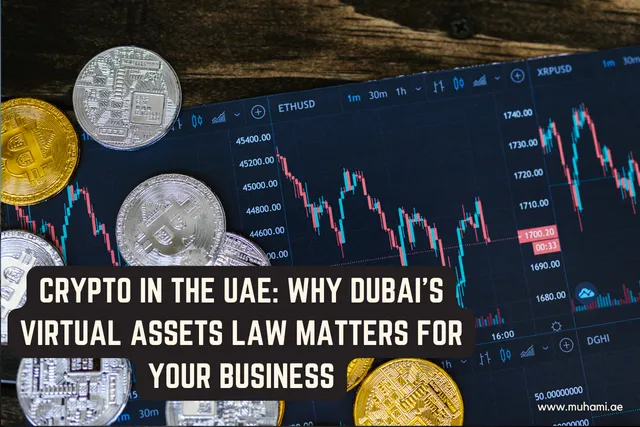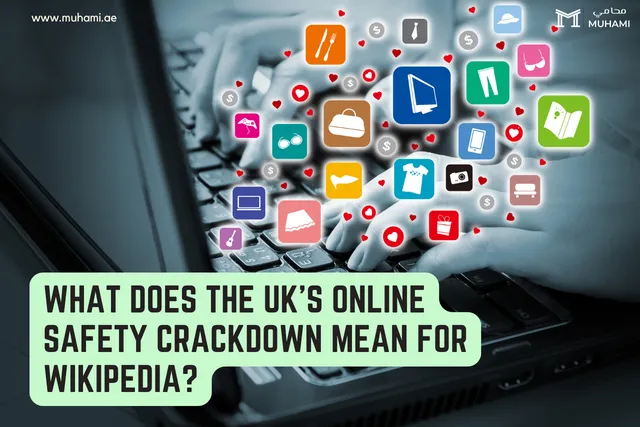Crypto in the UAE: Why Dubai’s Virtual Assets Law Matters for Your Business

In recent years, the United Arab Emirates (UAE) has emerged as a global hub for innovation in financial technology, including the rapidly evolving world of cryptocurrencies and virtual assets. As digital currencies gain traction across the globe, the UAE has taken proactive steps to establish a robust regulatory framework. This ensures not only the safety and stability of the financial system but also fosters investor confidence and encourages innovation. One of the most significant developments in this space is Dubai’s Virtual Assets Law, introduced in 2022, which positions the emirate as a leader in the regulation of virtual assets.
The UAE’s Progressive Crypto Regulation
The UAE has adopted a forward-thinking stance on cryptocurrency, choosing regulation over restriction. Federal and local authorities aim to attract global businesses while ensuring compliance with anti-money laundering (AML) and counter-terrorism financing (CTF) standards. Notably, Cabinet Resolution No. 111 of 2022 empowers the Securities and Commodities Authority (SCA) to regulate virtual assets nationwide, outside of financial free zones.
Dubai’s Pioneering Virtual Assets Law
In March 2022, the Emirate of Dubai enacted Law No. 4 of 2022 Regulating Virtual Assets in the Emirate of Dubai, commonly known as the Dubai Virtual Assets Law. This groundbreaking legislation was the first of its kind in the region and established a dedicated regulatory body—the Virtual Assets Regulatory Authority (VARA)—to oversee the sector.
Key Objectives of the Law:
The Dubai Virtual Assets Law aims to:
-
Establish a legal framework to protect investors and ensure transparency.
-
Encourage responsible innovation and the development of a digital economy.
-
Attract international companies and talent to Dubai’s virtual asset ecosystem.
-
Prevent the misuse of virtual assets in criminal activities.
The law applies to all virtual asset-related activities conducted in or from Dubai, including through special development and free zones (with the exception of the Dubai International Financial Centre, or DIFC, which has its own regulator, the Dubai Financial Services Authority).
What is Considered a Virtual Asset?
Under the law, a virtual asset is defined broadly as a digital representation of value that can be traded or transferred digitally and used for investment purposes. This includes cryptocurrencies, utility tokens, and non-fungible tokens (NFTs), among others.
Role and Functions of VARA
The establishment of the Virtual Assets Regulatory Authority (VARA) represents a significant step in institutionalizing the digital asset space in Dubai. VARA is responsible for:
-
Licensing and regulating virtual asset service providers (VASPs).
-
Monitoring market activities to ensure compliance with the law.
-
Developing guidelines and policies to govern the sector.
-
Coordinating with international regulators to align with global best practices.
Companies engaging in activities such as crypto trading, asset management, custodial services, and exchange operations must obtain the appropriate licenses from VARA before commencing operations.
Compliance and Licensing Requirements
Entities seeking to operate in Dubai’s virtual asset space must meet stringent compliance standards. These include:
-
Implementing robust AML and CTF procedures.
-
Demonstrating technological and operational security.
-
Ensuring transparency in pricing and transaction handling.
-
Submitting to regular audits and supervision by VARA.
Non-compliance with the Virtual Assets Law can result in significant penalties, including license suspension, fines, or even criminal prosecution in severe cases.
Alignment with International Standards
Dubai’s Virtual Assets Law and the broader UAE crypto regulatory environment have been designed to align with international frameworks, particularly those recommended by the Financial Action Task Force (FATF). This alignment helps ensure that the UAE remains off international blacklists and is perceived as a responsible and trustworthy jurisdiction for digital finance.
Future Outlook
With VARA at the helm and the Virtual Assets Law providing legal certainty, Dubai is well on its way to becoming a global center for virtual asset innovation. The Emirate continues to attract leading blockchain and crypto firms, bolstered by favorable tax conditions, a strategic location, and a clear regulatory path.
The UAE’s balanced approach encouraging innovation while prioritizing consumer protection serves as a model for other jurisdictions navigating the complex world of cryptocurrency regulation.
How The ASK Consultancy Can Help
Navigating the legal and regulatory requirements surrounding virtual assets in the UAE can be complex. AtThe ASK Consultancy, we provide expert guidance to help businesses understand compliance obligations, obtain licenses, and operate confidently within the legal framework. Whether you're a startup entering the crypto space or an established firm seeking expansion into the UAE, our legal and regulatory experts are here to support your journey.
Contact us today to learn more about how we can assist with your cryptocurrency and virtual asset legal needs in the UAE.
Any Questions?
Connect with lawyers and seek expert legal advice
Share
Find by Article Category
Browse articles by categories
Related Articles

What Does the UK’s Online Safety Crackd…
The U.K.'s Online Safety Act (OSA) has faced significant criticism for its …

What Does the UK’s Online Safety Crackdown Mean f…
The U.K.'s Online Safety Act (OSA) has faced …

The Power & Pitfalls of Joint Ventures …
I still remember sitting in my first JV meeting in Dubai. Two developers one ow…

The Power & Pitfalls of Joint Ventures in Dubai R…
I still remember sitting in my first JV meeting i…

How to Spot Burnout Before It Becomes a…
Burnout rarely happens overnight. It builds slowly, often silently, which makes…

How to Spot Burnout Before It Becomes a Resignati…
Burnout rarely happens overnight. It builds slowl…
